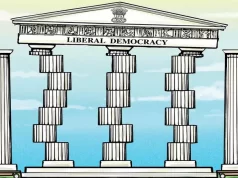“I have studied some of the cases tried under it (section 124A) and I know that some of the most loved of India’s patriots have been convicted under it. I consider it a privilege, therefore, to be charged under that section,” read Mahatma Gandhi’s statement following his conviction on sedition charges in 1922, for inciting disaffection towards the British rulers through his writings in the magazine Young India. Almost a hundred years hence, freedom of speech and expression still remains a distant dream for the nation. Of course, we’ve moved forward with the time and trends, so now, we arrest people for liking a Facebook post.
Freedom of speech and expression are not privileges that the government provides to its citizens, they are our natural rights as individuals. It is to defend these basics that we elect governments. Every individual has a unique way of living and thinking, a way that you expect the state to safeguard so that you can pursue your goals without fear. But what happens when the government uses this power, bestowed upon them by you, and uses it to instil fear in you? What happens when the government instead of ‘protecting’ your dues as a human being and as a citizen, starts thinking it’s ‘granting’ these rights to you?
Left unchecked, even representative governments tend to represent the government more than the people, through the unreasonable exercise of power. A striking example of this is India’s law on sedition under Section 124 (A) of the Indian Penal Code, punishable either by imprisonment for life or for three years with or without a fine. More often than not it has been used to bully the government’s outspoken critics. Sedition by definition is an act “inciting people to rebel against the authority of a state or monarch”. This authoritarian law was introduced by the British way back in 1870 to maintain the supremacy of the crown and to fracture dissent. But while the British themselves got rid of this archaic law in 2009, political parties in India stubbornly refuse to let go of it, some even vowing to make it more stringent. Many argue that despite the opposition the colonial-era law has been preserved to pacify the insecurities of the many governments that have ‘ruled’ the nation since independence.
The government, in its defence of the sedition law, has often cited the nation’s security as the major reason why sedition law cannot be foregone. But it would do us good to remember that the sedition law overtly protects the ‘government’ and does not mention the word ‘nation’ at all. Which necessarily means that the law mandates, not loyalty to your nation but loyalty to the government that’s ruling the nation at that point of time. As such, perhaps it’s not an exaggeration to say that the law exists primarily to ensure the security of the government, and by extension the political party running the government, rather than the security of the nation.
Even more astonishing than its oppressive nature, is its widespread and frequent misuse. As per the data by the Ministry of Home Affairs, only 2 of 179 people arrested on the charges of sedition were convicted between 2014 to 2016. What’s more absurd is the nature of cases under which the police has apprehended people under the charges of sedition which includes things as banal as liking a Facebook post, cheering a different sports team, or drawing cartoons. Is this sedition or a blatant attack on an individual’s freedom of speech and expression, promised under article 19(1)(a) of the Indian Constitution?
The Supreme Court of India in the 1962 Kedar Nath Singh vs the State of Bihar judgement expressed its interpretation of sedition as the acts or words that stimulate violence and public disorder and that “someone’s statement criticising the government does not invoke an offence of sedition or defamation.” Many lawyers and activists have later pointed out that criminal laws in the IPC are sufficient to deal with acts of violence and terrorism, making the existence of sedition law moot. The Law Commission’s 2018 consultation report on sedition too called for a rethink or repeal of the sedition law stating that “dissent and criticism are essential ingredients of a robust public debate on policy issues as part of vibrant democracy” and laws such as Unlawful Activities Prevention Act, 1967, Criminal Law Amendment Act, of 1961 and National Honours Act among others already safeguard the security challenges often attributed to sedition. If our fears of security as citizens of a country are taken care of, what good could a law like sedition do?
Despite the judicial inference of the law being expressed on numerous occasions, in most cases, this interpretation has been overlooked by the government and charges have been levied notwithstanding, citing national security or public disorder. This law being ‘cognizable (no warrant required for an arrest), non-compoundable (no compromise between the accused and the victim permitted), and non-bailable offence’, puts innocent people in the harsh, cumbersome and unabating processes of the Indian judiciary, which is punishment enough for the innocent.
We’re stuck in a rut of obedience, which makes criticism impossible, dissent difficult and disagreement criminal. For a democratic society, a rule so illiberal, so disdainful of free speech and statist in its persuasion, warrants an immediate repeal.
Learn more: https://spontaneousorder.in/so-basically-episode-04-is-sedition-deshdroh/
Post Disclaimer
The opinions expressed in this essay are those of the authors. They do not purport to reflect the opinions or views of CCS.






